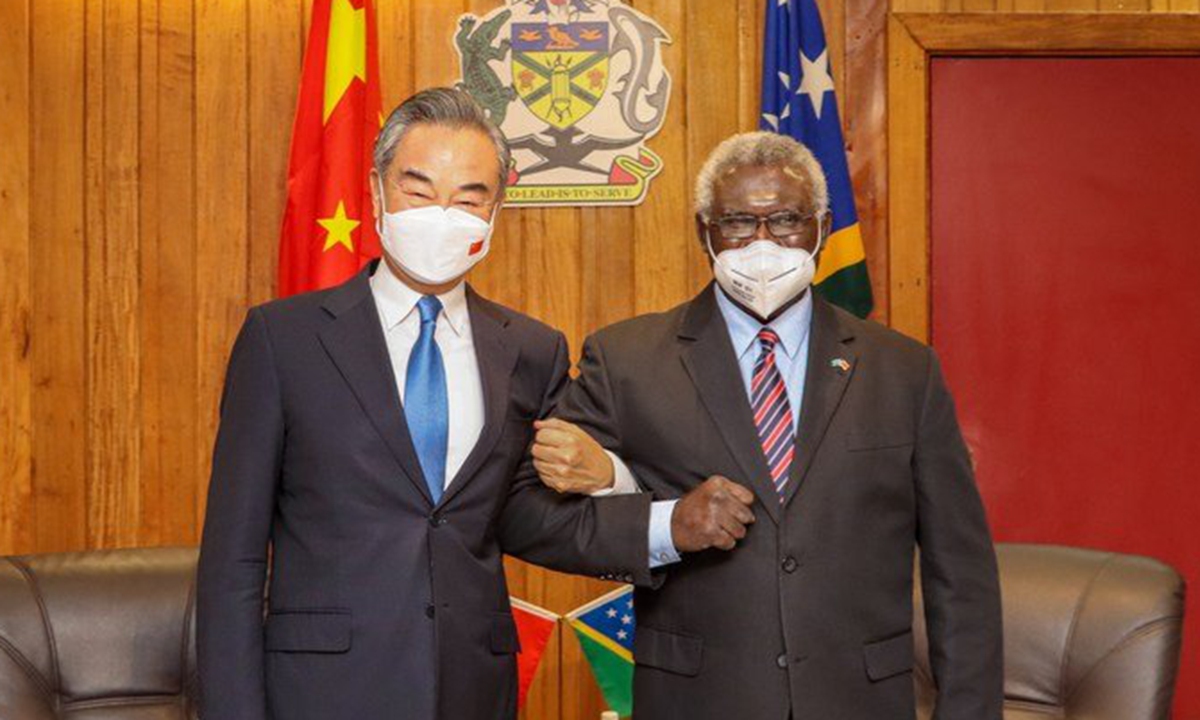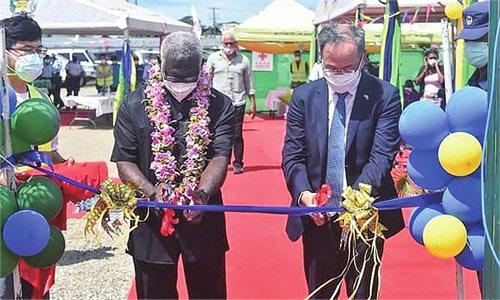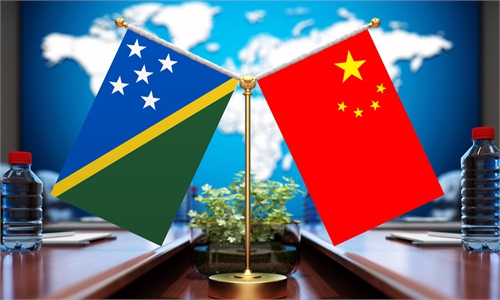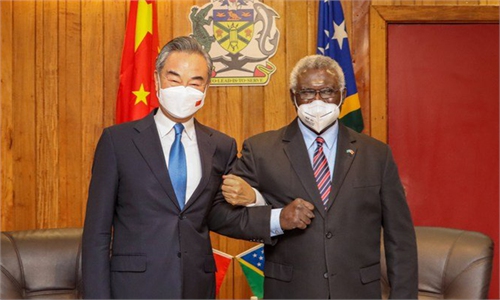
Chinese State Councilor and Foreign Minister Wang Yi (left) holds arms with Solomon Islands Prime Minister Manasseh Sogavare after arriving in Solomon Islands for a visit on May 26, 2022. Photo: Courtesy of Chinese Ministry of Foreign Affairs
The visit by Chinese Foreign Minister Wang Yi to the Solomon Islands on May 26, part of a 10-day tour of the South Pacific, including Kiribati, Samoa, Fiji, Tonga, Vanuatu, Papua New Guinea, and East Timor, has stoked western fears about growing Chinese influence in the region. Upon his arrival to the capital Honiara, the Chinese Foreign Minister is expected to sign cooperation agreements with the Solomon Islands.The Chinese Foreign Minister's diplomatic swing through the South Pacific is viewed by the US and Australia as part of a concerted effort from Beijing to upend a developing strategy intended to contain China's newly solidified presence in the South China Sea. This strategy builds on the concept of an enhanced US presence in East Asia that uses existing bases in Guam, Tinian, and Wake Island to expand the Washington's military presence in Australia, Papua New Guinea, and the Federated States of Micronesia.
The Chinese-Solomon Island pact, which allows for the possibility of a Chinese military presence in the island nation, has upended this newly minted US containment strategy, throwing both the US and Australia into a loop as they struggle to find a solution to this new reality. For years the focus of the US and Australia has been on pushing back on China's growing presence in the South China Sea. The expand of China's military deployment, combined with a growing reluctance from America's traditional regional allies to be drawn into a military conflict, prompted the development of the proposed East Asia containment strategy by the US and Australia.
For its part, the US has threatened the Solomon Islands with military retaliation if it allows China to build a permanent military base on its territory. Australia has seen the Chinese-Salomon Islands pact take center stage in its domestic politics, with newly elected Prime Minister Anthony Albanese pledging to establish a military training program intended to provide regional militaries with the ability against any deployment of military forces by China in the Solomon Islands.
The Chinese Foreign Minister's trip takes place after US President Joe Biden convened a meeting of the partners of the Quad - Japan, Australia, and India, aimed at limiting Beijing's economic and military influence in the region. The Quad meeting wants to put teeth to a blatant threat issued last month by the US to the Solomon Islands warning of a harsh response to any effort on the part of China to project military power into the region using the new maritime logistics agreement as justification.
There is, however, no military solution to China's pact with the Solomon Islands. The reality is that China's presence in the South Pacific is built under an economic and diplomatic scope. While both the US and Australia have reached out to the Solomon Islands to identify areas of mutual concerns since the announcement of the existence of the maritime logistics pact, it is literally a case of too little, too late. During a recent visit by a US delegation led by Kurt Campbell, National Security Council Indo-Pacific coordinator, and Daniel Kritenbrink, the assistant secretary of state for East Asian and Pacific affairs, the US discussed plans for the reopening of the its embassy in Honiara, which has been closed since 1993.
While both the US and Australia have called the construction of any Chinese military base in the Solomon Islands a "red line", the reality is that the Chinese-Solomon Island pact is more about Beijing asserting its economic and diplomatic strength than any military muscle flexing. While the US has not had formal diplomatic relations with the Solomon Islands for nearly 30 years, China has been seeking to expand its relations with the island nation since opening its embassy in 2020. The reality is two years of diplomatic and economic engagements beat out thirty years of neglect. The mistake the US is making in seeking to militarize the situation vis-à-vis the Solomon Islands is that it is, yet again, failing to understand that relations among nations, like those among people, are best accomplished through helping hands and not clenched fists.
The author is a former US Marine Corps intelligence officer. opinion@globaltimes.com.cn



